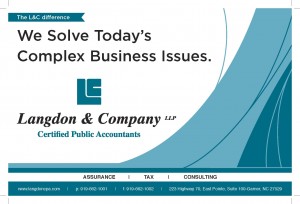by Tony Pandiscia,
As a CPA firm, we often encounter new or existing organizations inquiring about becoming tax exempt under a misconception that “tax exempt status” provides a broad immunity from all taxes and tax return filings. As a refresher, Tax Exempt Organizations (or “TEOs”) attain a legal existence under the province of state law (such as North Carolina’s “Nonprofit Incorporation Statutes”) before applying for “tax exempt status” with our Federal Government. Once the Internal Revenue Service grants a TEO Federal exempt status, a key benefit is the exclusion from income tax on all program service related revenue (i.e. revenues generated from activities directly related to a TEO’s exempt purpose). However the following represent other tax-related filings and liabilities that nevertheless apply to TEO:
INCOME TAX FILINGS AND UNRELATED INCOME. Although enjoying an exemption from income tax liability on “program service revenue”, to preserve its tax exempt status a TEO must annually file Form 990, Return of Organization Exempt from Income Tax and disclose all relevant financial information and exempt function policies and procedures. In addition, whenever income is generated via activities that are not related to an organization’s stated exempt purpose, “Unrelated Business Income Tax” (or “UBIT”) is earned. A UBIT tax return must be filed with both the Internal Revenue Service and North Carolina Department of Revenue and corresponding UBIT tax payments remitted.
SALES TAXES. Apart from the income tax reporting requirements, TEOs are put on a nearly level playing field with all businesses and consumers with respect to North Carolina Sales & Use Tax. North Carolina’s “Sales & Use Tax” is an ad valorem tax typically levied at the point of purchase, although a TEO may later recoup (via filing of a refund claim form) any taxes paid for purchases used directly in furtherance of its exempt purpose.
Beginning in 2015, TEOs who charge admission to attend a live function will be subject to Sales & Use Tax on the admission charge levied on attendees. Only TEOs that rely entirely on volunteer workforce and do not compensate any of the performers in the entertainment event will qualify for exemption. In addition, TEOs should properly designate those amounts that do not strictly represent a charge for admission (including membership fees, specific charitable donations, and payment for amenities such as parking or merchandise discounts) as they may excluded from the sales tax base.
SOLICTATION LICENSES. All TEOs that solicit contributions in North Carolina must register with the Secretary of State and obtain a “Charitable Solicitation License” [“CSL”]. Once obtained, the organization must annually renew the CSL with the filing of a renewal form, payment of a fee, and submission of financial data. A very narrow exemption from the licensing requirements applies for TEOs that solicit less than $25,000 of contributions per year and which are run entirely by volunteer labor. Upon request, the Secretary of State does permit affiliate organizations to request a “consolidated” license that covers all organizations in the group.
In summary, as a sound tax policy designed to incentivize organizations to engage in charitable activities, tax exempt status grants to a TEO a valuable freedom from income tax on program service revenue. However organizations must remember that the exemption from income tax is not a blanket exemption from all manner of taxes and filing requirements. Tax Exempt Organizations must plan accordingly to meet the filing and tax payment obligations, and avoid subjecting themselves to excessive penalties and exemption jeopardy.
 Tony lead’s our tax department as an attorney and Certified Public Accountant with over twenty years of experience. Tony consults regularly with exempt organizations on matters related to recognition and preservation of tax status, unrelated business income tax, executive compensation, and internal policy matters. His expertise includes additional industries such as healthcare, real estate, research & development, manufacturing, and professional services. Tony is a frequent seminar instructor for the North Carolina Association of CPAs, for local trade groups and is regularly called upon by litigation counsel to provide expert witness testimony.
Tony lead’s our tax department as an attorney and Certified Public Accountant with over twenty years of experience. Tony consults regularly with exempt organizations on matters related to recognition and preservation of tax status, unrelated business income tax, executive compensation, and internal policy matters. His expertise includes additional industries such as healthcare, real estate, research & development, manufacturing, and professional services. Tony is a frequent seminar instructor for the North Carolina Association of CPAs, for local trade groups and is regularly called upon by litigation counsel to provide expert witness testimony.
Please feel free to contact our office for more information. Tony and our highly qualified tax department are available to answer your tax questions and provide any assistance you may need.


